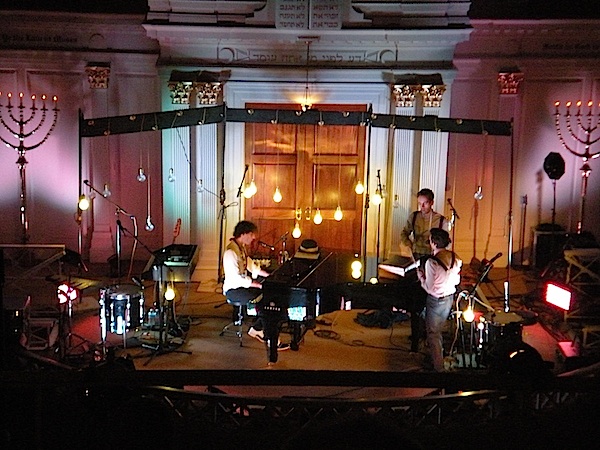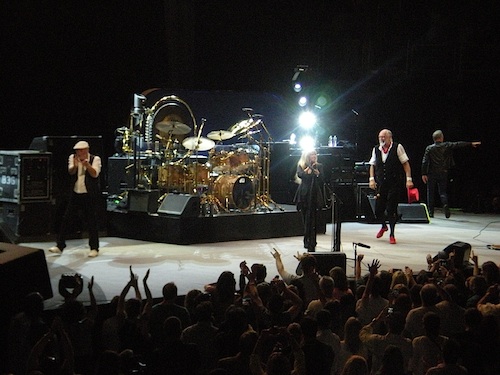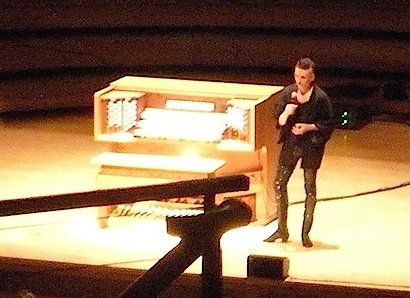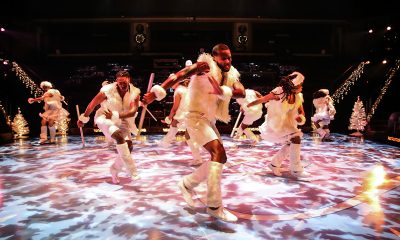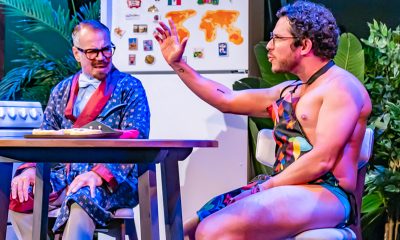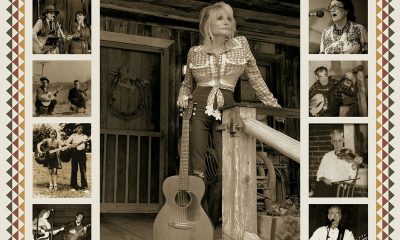Arts & Entertainment
Magical music nights
Great concert week in DC with the Mac, Mika and Cameron Carpenter
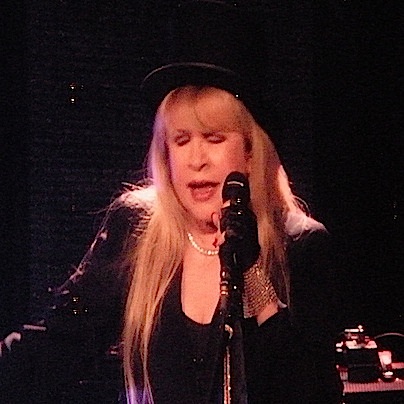
It was a great week for live music in Washington — Fleetwood Mac brought its “Tour 2013” to the Verizon Center Tuesday night, out pop singer Mika brought his acoustic show to the Sixth & I Synagogue Wednesday night and on Friday, queer organist Cameron Carpenter made his Washington-area debut at the Strathmore in Bethesda. The proceedings were stellar all around — I’ll dissect chronologically.
Many, many years of following various pop and rock acts has brought me to the realization that so many acts sort of “train” their audiences what to expect and the Mac is a perfect example. Its members — namesake rhythm section Mick Fleetwood and John McVie along with singer/songwriters Stevie Nicks and Lindsey Buckingham — talk in interviews as if they’re dutifully restricted from mixing things up too much because even with longtime songstress Christine McVie long gone (only one of her songs was performed — the chestnut “Don’t Stop”), they still have a truckload of ground they feel obligated to cover with songs like “Second Hand News,” “The Chain,” “Dreams,” “Rhiannon,” “Go Your Own Way” and the list goes on and on.
Thankfully the Mac — touring a second consecutive time now without a new album out — is throwing in a few surprises. Nicks has revived the long-dormant “Tusk” track “Sisters of the Moon” for the first time since the “Mirage Tour” in the early ’80s. There’s also one all-new track (“Sad Angel”) Buckingham says is slated for an imminent EP and the ancient-but-never-released song “Without You,” a ballad that featured perhaps the loveliest Buckingham/Nicks harmonies of the evening.
Except for some very anti-Mac-like remix-type looping touches brought into “World Turning,” the arrangements were tried and true. Nobody could argue the Mac doesn’t know how to give the masses what they want. Which can be a little disappointing for the die hards who go hear them every time they tour. Or even the more casual fans who tend to be more musically adventurous. Though many of the suggestions thrown about are utterly absurd — Thomas Conner’s naive op-ed in the Chicago Sun-Times last week is a great example — I could have gone for maybe 10 percent more adventure. A good starting point would have been “Soldier’s Angel,” the haunting duet Buckingham joined Nicks on for her brilliant 2011 album “In Your Dreams.”
With some acts — Madonna for one — you know you’re not going to hear every hit every tour. The Mac has never been like this, yet a few more unexpected moments would keep them a notch or two further away from the “cashing in/gravy train” bandwagon they’re clearly on. If you think for a second this is about the music and not the money, recall the arm twisting it took to get Nicks to agree to this. There was a well-publicized ballyhoo in 2012 when Fleetwood whined in a Playboy interview that he doubted the Mac would ever tour again when Nicks insisted on giving her solo album another year of touring. It was so wildly overstated that here they are on tour the very next year. (Nicks said later three years — and she’s right — feels like a good amount of time to go between Mac tours.)
While the band has been more about money than music for eons, I will say a few quick things: one, the music at Tuesday night’s show was scary good. Nicks, though she doesn’t scream and growl as she used to, has developed into a very solid singer. There wasn’t one off-pitch sound that came from her mouth the whole night. And Buckingham’s guitar work was as great as it has ever been. If there’s one upside to the lack of Mac recordings in the last 10 years or so, it’s that Buckingham’s solo career has soared off in the other direction with a trio of masterfully conceived and executed solo albums (2006’s “Under the Skin,” 2008’s “Gift of Screws” and 2011’s “Seeds We Sow”).
Given the way the Internet has decimated album sales — especially new work from veteran acts — one can hardly argue with their “let’s just tour” approach. Still nobody seemed to notice the irony of the situation when Buckingham spoke about not wanting to run something that worked (“Rumours”) into the ground when it came time to make “Tusk.” Sadly now the band is doing almost exactly that — touring clearly works (I’ve never seen the Verizon Center so packed and on a weeknight no less) so why be bothered with doing a new album? While the night was great fun, the reality that the Mac seems highly uninterested in doing much beyond trudging out the staples — Nicks is the chief foot dragger — lent the proceedings a bittersweet air.
And why can’t we all just agree to let Christine McVie do what she wants? Legions of the Mac faithful seem to be holding out hope that she’ll one day rejoin them for one last outing. While yeah, that would be cool for “old time’s sake” (McVie said recently she would consider joining them on stage in London if they ask her later this year), they’ve already done that. Why do we need another “The Dance”-type outing (the name of a ’97 reunion tour with the classic lineup), especially if McVie’s heart is not in it? I would feel differently if they’d never done “The Dance,” but since they have, it’s time for everybody to move on.
Mika’s show the next night was an interesting study in contrasts — from a veteran band reliving its glory days to a young singer (he’s 29) only on his third album playing a small, atmosphere-heavy synagogue (it’s actually a great concert spot — much more music-friendly than the much-lauded 9:30 Club) with a throng of young fans at fever-pitch excitement throughout the evening. Touring behind his near-masterpiece album of last fall “Origin of Love,” the obscenely talented popster poured his passionately creamy falsetto-hued vocals and drivingly percussive piano playing through a nearly two-hour set that was the furthest thing from phoned in you could imagine.
Working with a tight two-man band — players who seemed to grab any instrument of the dozens on stage they could quickly get their hands on — Mika radically reinvented several songs from their studio versions (a ballad version of dance cut “Stardust” from the new album was perhaps the most radical), led several all-out audience sing-alongs (and the crowd knew every word) on “Grace Kelly,” “Love Today” and “Celebrate” among others, and even stepped away from the mic for nearly two full numbers just to savor the acoustics — which are stellar — of the venue. All were show-stopping in the best way.
Mika truly has it all — killer voice, great songwriter, solid musical chops and just-left-enough-of-center looks and charm to never be mistaken for a “Bachelor” contestant. He’s sort of our queer Justin Timberlake — with a much better current album out too, by the way.
Switching gears radically was Cameron Carpenter’s organ recital Friday night which, despite a few logistical head scratchers (more on that in a sec), was a musical accomplishment of Herculean, truly other-worldly proportions. Watching and hearing him play is much akin to the scene in the classic “Outer Limits” episode (“The Sixth Finger”) in which a scientist figures out a way to push evolution ahead a million years and suddenly the protagonist can play Bach he just picked up. Carpenter is almost in that league, having been something of a child prodigy who claims to have mastered “The Well-Tempered Clavier” in adolescence.
The first oddity was why Carpenter — with all the amazing pipe organs in Washington — was at the organ-less Strathmore at all. Playing an electronic Rodgers three manual brought in just for the occasion, Carpenter got more sonic contrast out of the thing than probably anybody else could have, but from the massive instrument at the National Cathedral, the new pipe organ at the Kennedy Center (where he’s rumored to be playing next year sometime) or even the glorious five-manual behemoth at National City Christian Church in Thomas Circle (which could just about have housed the somewhat disappointing turnout — of the Strathmore’s three balconies, only the lowest one was about half-full; the upper two sat empty), it seemed just plain dumb to have him there. It could be a harbinger of things to come — Carpenter’s most insistent recurring theme is his endless frustration at having to adapt to a different organ for each town he plays. Let’s hope whatever touring instrument he ends up with — he says it’s almost finished — has a little more sonic heft than the Rodgers. Which sounded OK — I’m not trashing it altogether. One could clearly tell, though, that it was a sound coming from speakers, not pipes.
That said, what Carpenter did with it was beyond staggering. His musical instincts — as sharp and deadly as Wolverine’s knife claws — are in a league of their own among organists, at least to my knowledge. He plays with a pianistic-like virtuosity that’s stunning to watch (a screen above him amplified his finger work). Often playing two manuals simultaneously with one hand, leap-frogging between the choir, great and swell like an Olympic sprinter and displaying the most nimble pedal work I’ve ever seen, Carpenter truly is a talent for the ages. Granted, the Rodgers had a minimal number of stops it appeared — it looked like a child’s toy compared to, say, the National City console — yet Carpenter changed registrations like most people blink. One five-minute improvisation he played featured more than 40 registration changes. That amount of tone painting just through stop changes was impressive in and of itself, forget about the actual note playing.
His wildly eclectic 100-odd minute show (played entirely from memory) featured everything from Bach works written for organ, transcribed for piano, then adapted back to organ (by Carpenter), two Liszt Transcendental Etudes he said were “nearly impossible to play,” a wickedly playful transcription of Bernstein’s “Candide” Overture and a playful encore/fantasia on — of all things — “Shortnin’ Bread,” a whimsical-but-no-less-dramatic way to end the evening. The highlights for me were a moody and languid — yet endlessly colorful — transcription of Isaac Albeniz’s piano work “Evocacion” (the first movement from “Iberia”) and a fantastically creative Marcel Dupre arrangement of a French Noel that Carpenter tackled in a deliciously subversive way, nearly matching the macabre wit Dupre brought to it originally.
Though nearly as night and day as one could fathom, all three shows were utterly magical and evenings I will never forget.
Fleetwood Mac’s set:
1. Second Hand News
2. The Chain
3. Dreams
4. Sad Angel
5. Rhiannon
6. Not That Funny
7. Tusk
8. Sisters of the Moon
9. Sara
10. Big Love
11. Landslide
12. Never Going Back Again
13. Without You
14. Gypsy
15. Eyes of the World
16. Gold Dust
17. So Afraid
18. Stand Back
19. Go Your Own Way
ENCORE
20. World Turning
21. Don’t Stop
ENCORE 2
22. Silver Springs
23. Say Goodbye
Mika’s set:
1. Grace Kelly
2. Toy Boy
3. Lollipop
4. Blue Eyes
5. Billy Brown
6. Popular
7. Love You When I’m Drunk
8. Underwater
9. Stuck in the Middle
10. Emily
11. Big Girls
12. Origin of Love
13. Happy Ending
14. Lola
15. Relax, Take it Easy
16. Stardust
17. Celebrate
18. Love Today
19. Over My Shoulder
Cameron Carpenter’s set:
1. Bach — Prelude 1 from “Well Tempered Clavier”/Fugue No. 15 in G Major
2. Bach/Busoni — Cello Suite No. 1
3. Bach — Fantasia and Fugue in G Minor
4. Albeniz — Evocacion from Iberia
5. Dupre — Variations on a Noel
6. Liszt — Feux Follets
7. Liszt — La Campanella
INTERMISSION
8. Bernstein — Candide Overture
9. Ives — The Alcotts from Concord Sonata
10. Improv
11. Improv
ENCORE
12. Chopin — Minute Waltz
13. Shortnin’ Bread
a&e features
35 years after ‘Truth or Dare,’ Slam is still dancing
Salim Gauwloos on Madonna, HIV, and why he almost didn’t audition for Blond Ambition Tour

Most gay men of a certain age remember “the kiss.”
It was the moment Madonna’s dancers Salim Gauwloos and Gabriel Trupin locked lips in the hit 1991 documentary film “Truth or Dare,” which is celebrating its 35th anniversary this spring.
The kiss was hot, but what made it groundbreaking is that it appeared in a mainstream Hollywood movie that screened in suburban multiplexes across the country. This wasn’t an obscure art house film. The movie, and tour on which it was based, received months of breathless media attention all over the world for bold expressions of female empowerment and queer visibility. Madonna was threatened with arrest in Toronto for simulating masturbation on stage and Pope John Paul II urged Catholics to boycott the show, triggering a media firestorm.
“Truth or Dare” was billed as a behind-the-scenes documentary of the tour, but it quickly became clear that the real star of the show wasn’t Madonna, but rather her colorful troupe of seven backup dancers, six of whom identified as gay: Kevin Stea, Carlton Wilborn, Luis Xtravaganza Camacho, Jose Gutierez Xtravaganza, Gauwloos, and Trupin; Oliver Crumes III identifies as straight.
We saw them party and march in the New York City Pride parade. They were unabashedly queer at a dangerous time — before protease inhibitors began to stem the AIDS plague and before most celebrities and politicians embraced the gay community in any real way. Being out in 1991 carried major risks to career and reputation.
Enter Gauwloos, one of those brave dancers who vogued his way into the hearts of countless gay men entranced by his handsome looks, his stage presence, and dance skills.
Gauwloos — known then and now as “Slam”— sat down with the Blade to talk Madonna, the lasting impact of “Truth or Dare,” the public disclosure of his HIV status, and plans for a new book on his life.
His story is fascinating — from growing up in Europe to dancing in New York to landing the gig of a lifetime with Madonna. He performed on that tour while secretly HIV positive and went without medical treatment for 10 years because he was living in the United States as an undocumented immigrant. Not even Madonna knew of his HIV status. Two other dancers on the tour were also HIV positive but no one talked about it. Ironically, Madonna was singing “Express Yourself” and advocating for condom use during her concerts yet backstage three of her dancers were secretly positive.
“A lot of people were dying so I wasn’t going to tell Madonna I had HIV,” said Slam, now 57. “And the others didn’t either. It wasn’t the moment to do it. She used to make speeches about Keith Haring and AIDS and I thought it’s going to be me next.”
Gabriel Trupin died of AIDS in 1995. Slam was diagnosed at age 18 in 1987, a frightening time when a positive test result often meant a death sentence. He booked the “Blond Ambition Tour” at age 21 after moving to New York. His friends encouraged him to audition but Slam resisted because he wasn’t a big Madonna fan.
“It was crazy, everyone wanted that job,” he said, “but I wanted to dance with Janet Jackson and Paula Abdul.” He listened to his friends and shortly after the audition, Slam received a call from Madonna herself inviting him to join the tour.
“We all wanted to be stars but not even Madonna knew how big that tour would become. The way it was choreographed and directed, the stars aligned. … It never looks dated even today.”

The world tour kicked off in Japan in April 1990 then moved to the United States and Europe, stirring controversy wherever it went. There was the iconic cone bra; the aforementioned simulated masturbation during “Like a Virgin”; and religious imagery that offended many Catholic groups and the Vatican.
And the controversy didn’t end with the tour. Cameras were rolling throughout the tour for what Slam thought would be a “video memory” for Madonna. But as the tour unfolded, director Alek Keshishian reportedly became more interested in what was happening behind the scenes so plans for mere tour footage were expanded into a full documentary.
“We were young and partying and didn’t really know what was going on,” Slam said. “You live in this celebrity bubble and you sign a paper – I don’t even know what I signed.”
In 1992, Kevin, Oliver, and Gabriel sued Madonna for invasion of privacy and fraud claiming she used some footage without their consent. They claim they were told nothing would be included in the film that they didn’t want to be seen. In one specific incident, Gabriel alleged that he told producers he didn’t want the scene of him kissing Slam to be in the film as he wasn’t fully out.
“Gabriel was forcibly outed,” in the movie, Kevin said in a 2016 interview.
Slam did not join his colleagues in the lawsuit.
“I couldn’t sue because I was illegal but I wasn’t ever going to sue,” Slam said. “I’m not a suing kind of person. But good for them, they fought for it and won. A lot of people don’t have the balls to sue Madonna.” The suit was settled two years later for an undisclosed sum.
“We were all conflicted about the kiss,” he said with a laugh. “The kiss, oh my God, my boyfriend is going to kill me! Belgian stress!”
Beyond worrying about his boyfriend’s reaction, Slam had concerns about the impact of being openly gay on his modeling career.
“In 1990, you couldn’t get high fashion campaigns as an openly gay model,” he said. “I was worried about that. I couldn’t get a campaign because I was gay. My agency told me to say I was straight and it was just a game.”
In 2016, pegged to the 25th anniversary of “Truth or Dare,” the surviving six dancers filmed a documentary about their lives post-Madonna titled “Strike A Pose.” In it, Slam publicly revealed his HIV status for the first time in an emotional scene with his former colleagues.
“I found the strength to tell the world I have HIV,” he recalls. “I was scared but I felt brave. The outcome and messages were beautiful. After I saw ‘Strike A Pose,’ I knew we gave people hope. And not just for gay people.”
He was infected in 1987 but didn’t get treated until 1997. After the tour ended, he said he went into a depression and his agency dropped him.
“I was partying too much after the tour,” he recalls. “I made a decision to live as an illegal alien.” In 1997, Slam collapsed and was rushed to the hospital with pneumonia.
“They started treating me and thank God the new HIV drugs were out, the cocktails, it took me a couple months to get better.”
Madonna didn’t participate in “Strike A Pose” and Slam said he hasn’t seen or spoken to her since the end of the tour. He said he had no idea of the impact “Truth or Dare” would have.
“You look at this movie in 1991 and you don’t think it’s going to be such a big thing and 35 years later it’s still helping people,” he said. “It was helpful for people who felt alone at that time. It was such an important documentary.
“I don’t think younger gay people realize how important Madonna was to gay and queer visibility — she was a big part of it. We showed the world it’s OK to be gay and that was the great message of this movie.”
He noted that, decades later, many of his friends have transgender kids and that queer culture is represented in much of mainstream pop culture.
“It’s amazing how far we’ve come,” he said. “I know we’ll always be marginalized but we have come so far. I’m really proud of our community. The current nightmare will be over and I do believe that things will get better.”
Referencing President Trump’s attacks on the LGBTQ community and crackdown on immigration, Slam described the situation in the U.S. today as “sad.”
“Everything is such a mess,” he said. “Some of these people have lived here 30-40 years and they take you out of your home. I can’t even imagine. It breaks my heart. When I was illegal it was a different story.”
Slam met his husband, Facundo Gabba, who’s from Argentina, in 2000, and he helped him get a legal case together to win citizenship. He filed a case in 2001 and was told there was a 99 percent chance he wouldn’t be permitted to stay in the United States because they weren’t allowing HIV-positive immigrants to remain in the country. But he got his green card anyway in 2005 and became a U.S. citizen in 2012.
Today, Slam and Gabba live in Brooklyn, though they travel a lot because “I can’t take the cold.” The couple married in Argentina in 2010 and in the U.S. in 2016.
Slam is still dancing and working as a choreographer. He’s teaching at a contemporary dance festival in Vienna in July and even offers online lessons via Salimdans.com.
As a longtime HIV survivor, Slam is dedicated to a healthful lifestyle.
“You have to keep moving; when you move you stay healthy,” he says. “Dance heals everything. I do yoga, I eat healthy and clean as possible. I don’t watch much TV … I try to stay healthy and positive. If I absorb all of the negativity I would be sick.”

In addition to his ongoing work in dance and choreography, Slam is in the early stages of writing a book about his extraordinary life and pioneering career.
“I always knew I had a book inside of me. I want to talk about my HIV status. I know I can inspire more people. I want to tell even more secrets in the book; secrets are a poison so I want to tell everything.”
Among those secrets, he notes, is a desire to write about his strict Muslim father and the years he spent as an undocumented immigrant in America.
“Those are the things I want to talk about, the struggles. It’s a love story, hope and resilience. I know it will help people.”
As for his friends from the tour, Slam says he remains in contact with Gabriel’s mother and José Xtravaganza is his best friend. Baltimore’s Center Stage theater is currently developing a new musical about Xtravaganza’s life. And Slam said he occasionally talks to Oliver, though “he still can’t pronounce Sandra Bernhard’s name.”
At the end of our interview, Slam indulged a round a rapid fire questions:
• Favorite song to perform in the “Blond Ambition” tour? “Express Yourself.”
• Aside from Madonna, who was your favorite artist you worked with? Toni Braxton in “Aida” on Broadway.
• Favorite Madonna song? “Live to Tell”
• Favorite Madonna video? “Bedtime Stories”
• What’s more stressful: performing in a concert or performing on the VMAs? “Both, because we always had to be perfect.”
• Did you go to Madonna’s recent “Celebration” tour? “I didn’t see the show but I saw clips online.”
• What do you remember most about performing “Vogue” at the VMAs? “It was nerve-racking for them to flip those fans.”
• When was the last time you vogued? “I teach classes so a couple weeks ago.”
Books
Love or fear flying you’ll devour ‘Why Fly’
New book chronicles a lifetime obsession with aircraft

‘Why Fly’
By Caroline Paul
c. 2026, Bloomsbury
$27.99/256 pages
Tray table folded up.
Check. Your seat is in the upright position, the airflow above your head is just the way you like it, and you’re ready to go. The flight crew is making final preparations. The lights are off and the plane is backing up. All you need now is “Why Fly” by Caroline Paul, and buckle up.

When she was very young, Paul was “obsessed” with tales of adventure, devouring accounts written by men of their derring-do. The only female adventure-seeker she knew about then was Amelia Earhart; later, she learned of other adventuresome women, including aviatrix Bessie Coleman, and Paul was transfixed.
Time passed; Paul grew up to create a life of adventure all her own.
Then, the year her marriage started to fracture, she switched her obsession from general exploits to flight.
Specifically, Paul loves experimental aircraft, some of which, like her “trike,” can be made from a kit at home. Others, like Woodstock, her beloved yellow gyrocopter, are major purchases that operate under different FAA rules. All flying has rules, she says, even if it seems like it should be as freewheeling as the birds it mimics.
She loves the pre-flight checklist, which is pure anticipation as well as a series of safety measures; if only a relationship had the same ritual. Paul loves her hangar, as a place of comfort and for flight in all senses of the word. She enjoys thinking about historic tales of flying, going back before the Wright Brothers, and including a man who went aloft on a lawn chair via helium-filled weather balloons.
The mere idea that she can fly any time is like a gift to Paul.
She knows a lot of people are terrified of flying, but it’s near totally safe: generally, there’s a one in almost 14 million chance of perishing in a commercial airline disaster – although, to Paul’s embarrassment and her dismay, it’s possible that both the smallest planes and the grandest loves might crash.
If you’re a fan of flying, you know what to do here. If you fear it, pry your fingernails off the armrests, take a deep breath, and head to the shelves. “Why Fly” might help you change your mind.
It’s not just that author Caroline Paul enjoys being airborne, and she tells you. It’s not that she’s honest in her explanations of being in love and being aloft. It’s the meditative aura you’ll get as you’re reading this book that makes it so appealing, despite the sometimes technical information that may flummox you between the Zen-ness. It’s not overwhelming; it mixes well with the history Paul includes, biographies, the science, heartbreak, and exciting tales of adventure and risk, but it’s there. Readers and romantics who love the outdoors, can’t resist a good mountain, and crave activity won’t mind it, though, not at all.
If you own a plane – or want to – you’ll want this book, too. It’s a great waiting-at-the-airport tale, or a tuck-in-your-suitcase-for-later read. Find “Why Fly” and you’ll see that it’s an upright kind of book.
The Blade may receive commissions from qualifying purchases made via this post.
Theater
Out actor Kevin Cahoon on starring role in ‘Chez Joey’
Arena production adapted from Broadway classic ‘Pal Joey’

‘Chez Joey’
Through March 15
Arena Stage
1101 Sixth St., S.W.
Tickets start at $93
Arenastage.org
As Melvin Snyder in the new musical “Chez Joey,” out actor Kevin Cahoon plays a showbiz society columnist who goes by the name Mrs. Knickerbocker. He functions as a sort of liaison between café society and Chicago’s Black jazz scene circa 1940s. It’s a fun part replete with varied insights, music, and dance.
“Chez Joey” is adapted from the Broadway classic “Pal Joey” by Richard Rodgers and Lorenz Hart. It’s inspired by John O’Hara’s stories based on the exploits of a small-time nightclub singer published in The New Yorker.
A warm and humorous man, Cahoon loves his work. At just six, he began his career as a rodeo clown in Houston. He won the Star Search teen division at 13 singing songs like “Some People” from “Gypsy.” He studied theater at New York University and soon after graduating set to work playing sidekicks and comedic roles.
Over the years, Cahoon has played numerous queer parts in stage productions including “Hedwig and the Angry Inch,” “La Cage aux Folles,” “Rocky Horror” as well as Peanut in “Shucked,” and George the keyboardist in “The Wedding Singer,” “a sort of unicorn of its time,” says Cahoon.
Co-directed by Tony Goldwyn and the great Savion Glover, “Chez Joey” is a terrific and fun show filled with loads of talent. Its relevant new book is by Richard Lagravenese.
On a recent Monday off from work, Cahoon shared some thoughts on past and current happenings.
WASHINGTON BLADE: Is there a through line from Kevin, the six-year-old rodeo clown, to who we see now at Arena Stage?
KEVIN CAHOON: Anytime I want to land a joke in a theater piece it goes back to that rodeo clown. It doesn’t matter if it’s Arena’s intimate Kreeger Theatre or the big rodeo at the huge Houston Astrodome.
I was in the middle stadium and there was an announcer — a scene partner really. And we were doing a back and forth in hopes of getting laughs. At that young age I was trying to understand what it takes to get laughs. It’s all about timing. Every line.
BLADE: Originally, your part in “Chez Joey” Melvin was Melba who sings “Zip,” a clever woman reporter’s song. It was sort of a star feature, where they could just pop in a star in the run of “Pal Joey.”
CAHOON: That’s right. And in former versions it was played by Martha Plimpton and before her Elaine Stritch. For “Chez Joey,” we switched gender and storyline.
We attempted to do “Zip” up until two days before we had an audience at Arena. Unexpectedly they cut “Zip” and replaced it with a fun number called “I Like to Recognize the Tune,” a song more connected to the story.
BLADE: Wow. You must be a quick study.
CAHOON: Well, we’re working with a great band.
BLADE: You’ve played a lot of queer parts. Any thoughts on queer representation?
CAHOON: Oh yes, definitely. And I’ve been very lucky that I’ve had the chance to portray these characters and introduce them to the rest of the world. I feel honored.
After originating Edna, the hyena on Broadway in “The Lion King,” I left that to do “Hedwig and the Angry Inch” as standby for John Cameron Mitchell, doing one show a week for him.
Everyone thought I was crazy to leave the biggest musical of our time with a personal contract and getting paid more money that I’d ever made to get $400 a week at the downtown Jane Street Theatre in a dicey neighborhood.
At the time, I really felt like I was with cool kids. I guess I was. And I never regretted it.
BLADE: When you play new parts, do you create new backstories for the role?
CAHOON: Every single time! For Melvin, I suggested a line about chorus boys on Lakeshore Drive.
BLADE: What’s up next for Kevin Cahoon?
CAHOON: I’m about to do the New York Theatre Workshop Gala; I’ve been doing it for nine years in a row. It’s a huge job. I’ll also be producing the “Cats: The Jellicle Ball” opening on Broadway this spring; it’s a queer-centric uptown vogue ball with gay actor André de Shields reprising his role as “Old Deuteronomy.”
BLADE: There’s a huge amount of talent onstage in “Chez Joey.”
CAHOON: There is. I’m sharing a dressing room with Myles Frost who plays Joey. He won accolades for playing Michael Jackson on Broadway. We’ve become great friends. He’s a miracle to watch on stage. And Awa [Sal Secka], a D.C. local, is great. Every night the audience falls head over heels for her. When this show goes to New York, Awa will, no doubt, be a giant star.
BLADE: Do you think “Chez Joey” might be Broadway bound?
CAHOON: I have a good feeling it is. I’ve done shows out of town that have high hopes and pedigree, but don’t necessarily make it. “Chez Joey” is a small production, it’s funny, and audiences seem to love it.

